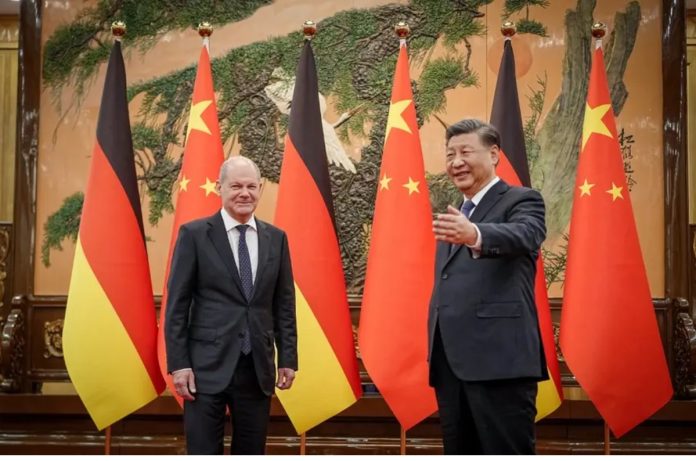The recent high-profile visit of German Chancellor Olaf Scholz, accompanied by a cohort of CEOs representing top German corporations, to China underscores the robust and enduring economic ties between two of the world’s economic powerhouses. This visit, the second of its kind in less than two years, illuminates the depth of the bilateral relationship between the second and third largest economies globally and heralds a new chapter in their collaboration.
Despite a slight downturn in two-way trade in 2023, totaling 253.1 billion euros, the China-Germany economic partnership remains formidable. China has retained its position as Germany’s largest trading partner for eight consecutive years, surpassing even the United States by a narrow margin. German companies continue to demonstrate confidence in China’s market, with direct investments reaching a record high of 11.9 billion euros in 2023, marking a 4.3 percent increase over the previous year.
The allure of China’s vast market potential and burgeoning economic growth prospects undoubtedly underpins the strengthening ties between German businesses and China. However, the symbiotic relationship extends beyond mere market dynamics. It is rooted in deep-seated supply chain connectivity, with both countries serving as pivotal nodes in the global R&D, manufacturing, and marketing ecosystem. German corporations, such as Merck, have strategically positioned themselves in China, leveraging its innovation prowess and integrated supply chains to bolster their global competitiveness.
Moreover, China’s emergence as a global leader in AI, big data, and other cutting-edge technologies further incentivizes German companies to establish a foothold in the country. By immersing themselves in China’s dynamic technological landscape, German firms not only enhance their market presence but also fortify their positions in the global marketplace.
In the face of geopolitical tensions and shifting economic paradigms, both China and Germany are recalibrating their strategies. Germany’s nuanced China Strategy Paper, released in 2023, reflects a multifaceted approach that acknowledges China as both a partner and a competitor. Chancellor Scholz’s visit seeks to foster candid dialogue and constructive engagement, dispelling misconceptions and reinforcing mutual trust. Contrary to the zero-sum mentality prevalent in some quarters, Germany envisions a multipolar world order, characterized by cooperation and mutual respect.
As both governments and businesses strive to navigate the complexities of the global economy, addressing recent fluctuations in bilateral trade becomes imperative. While the first quarter of 2024 witnessed a reversal of the downward trend, concerted efforts are needed to ensure sustained growth. China’s commitment to reform and opening-up, coupled with Germany’s renowned quality and reliability, bodes well for bilateral trade relations.
A stable and flourishing relationship between China and Germany not only serves their mutual interests but also contributes to global peace, multilateralism, and equitable economic development. As they forge ahead in their partnership, both nations exemplify the potential for collaboration and synergy in an interconnected world.




